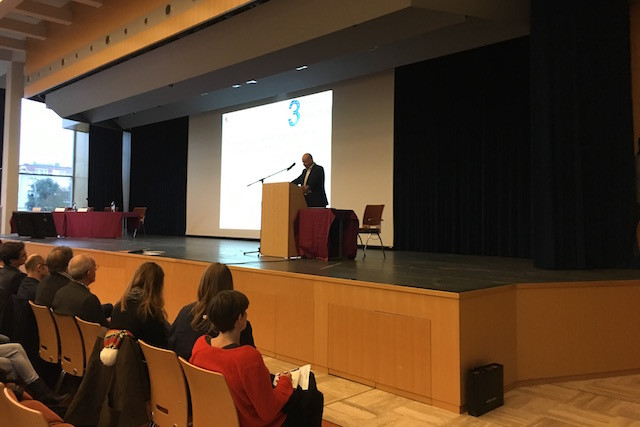On Monday morning, over 600 students from 17 schools listened to minister for the economy, Étienne Schneider, and Carlo Thelen, director general of the Chamber of Commerce, present some of the main conclusions of the Rifkin study.
The students had studied the report in class and submitted questions in advance.
The minister for transport, François Bausch, and finance minister, Pierre Gramegna, joined the panel to help answer questions.
This was the second time the students could interact with ministers on a topic which will concern them for the rest of their life.
Schneider said in his address that these students “would be the creators rather than the beneficiaries of this revolution”. The current model of economic growth was arriving at its end. The third industrial revolution was about de-carbonisation, digitalisation and disruptive technologies.
Thelen considered this disruptive era an opportunity. The objectives of the Chamber of Commerce, he said, were to help the biggest possible number of companies overcome this transition, to support start-ups, and to play an active role in the follow-up of the Rifkin study.
He also presented the top 5 skills that are likely to be needed in 2020:
- complex problem solving
- critical thinking
- creativity
- people management
- coordinating with others
Thelen talked about the initiatives such as bringing schools and companies closer together, and websites such as hellofuture.lu and winwin.lu which helps students in their job choices.
A student from the Lycée classique d’Echternach, who is in their penultimate year, explained how the conference worked to Delano:
“We covered the issues in class over 2-3 hours. Our teacher summarised the study for us and we had to research the important aspects at home. Students who had a question were asked to write it down and that student also had to ask it during the conference. The most important aspect of the study for me is climate change. Everything is connected to that: housing, mobility.”
The pre-submitted questions dealt with agriculture, smart energy, future business models of energy companies like Enovos and privacy.
High schools students from across the country attend a forum in Luxembourg City with several cabinet ministers to discuss the Third Industrial Revolution in Luxembourg, 30 January 2017. Photo: Staff
Gramegna talked about the future of financing: Luxembourg will support sustainable finances and attract so-called “green” investments. Microfinance, modern regulations such as banking regulations for virtual currencies and of course education are the focus of Luxembourg’s future financial regulation.
Another group of students in their final year at the Lycée technique de Lallange also found the experience valuable. One said:
“We already came last year, so this is like a repetition for us. But since the finance and transport ministers are here, it’s a bit different. Some things have changed and it’s interesting. I’m interested in the impact on jobs, how it will impact the job market. The job market will change a lot. It’s good to have a heads-up to know what is likely to happen. We still have the choice what we want to do in the future and that is why we’re here- so that we can take a certain route if it’s interesting.”
There were some spontaneous questions allowed on financial politics, unemployment and working from home.
Jos Salentiny, headmaster of the Athénée de Luxembourg who served as moderator, had the spontaneous idea to do a poll on how many students wanted to buy a car as soon as they found work, and more than half raised their hands. He jokingly said to Bausch, who promotes public transport, that he needs to do more convincing.

